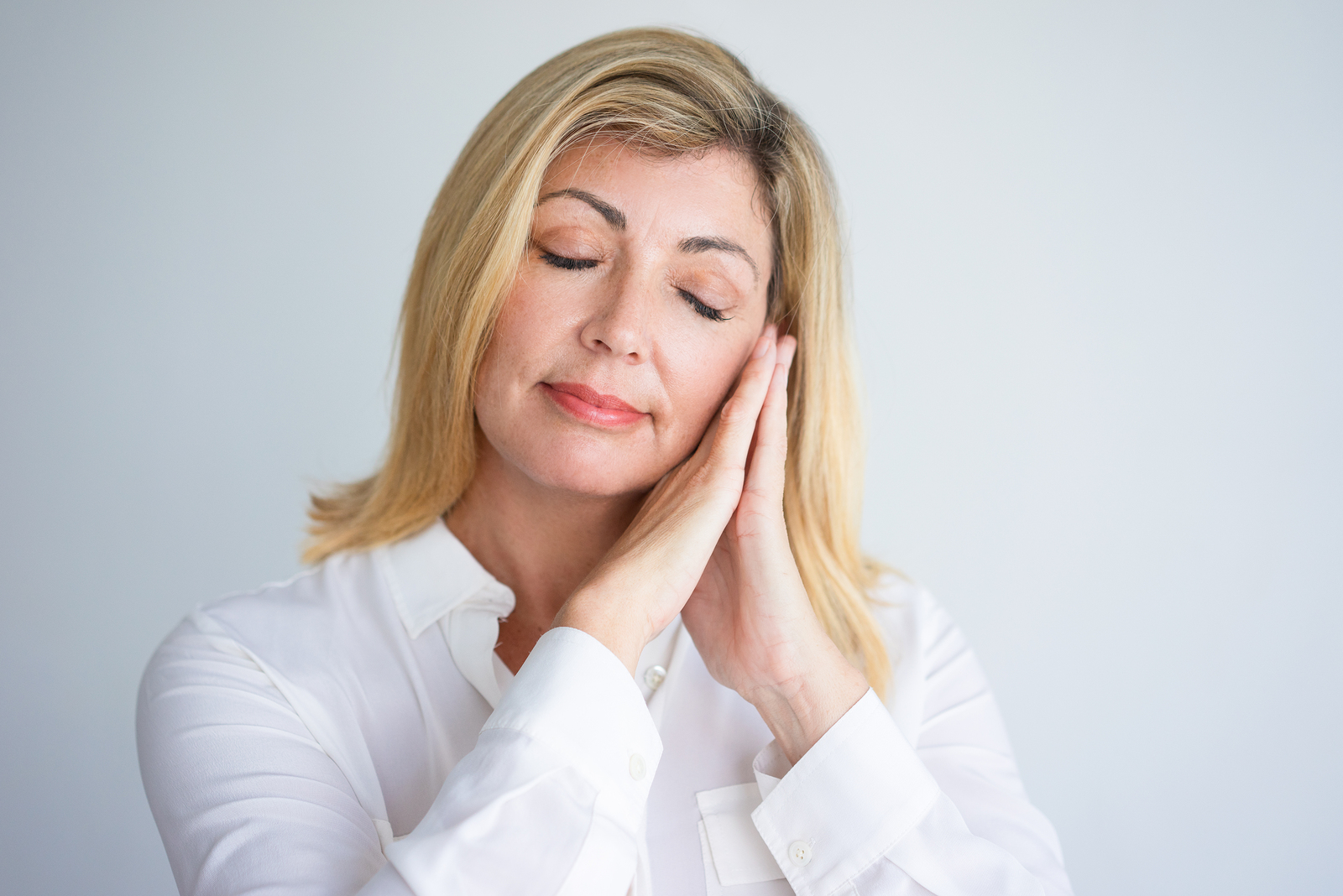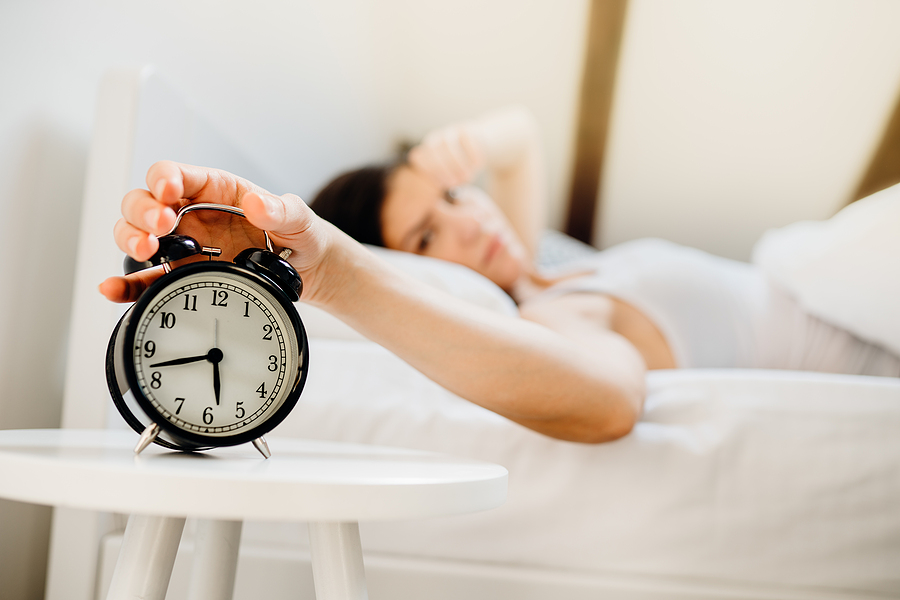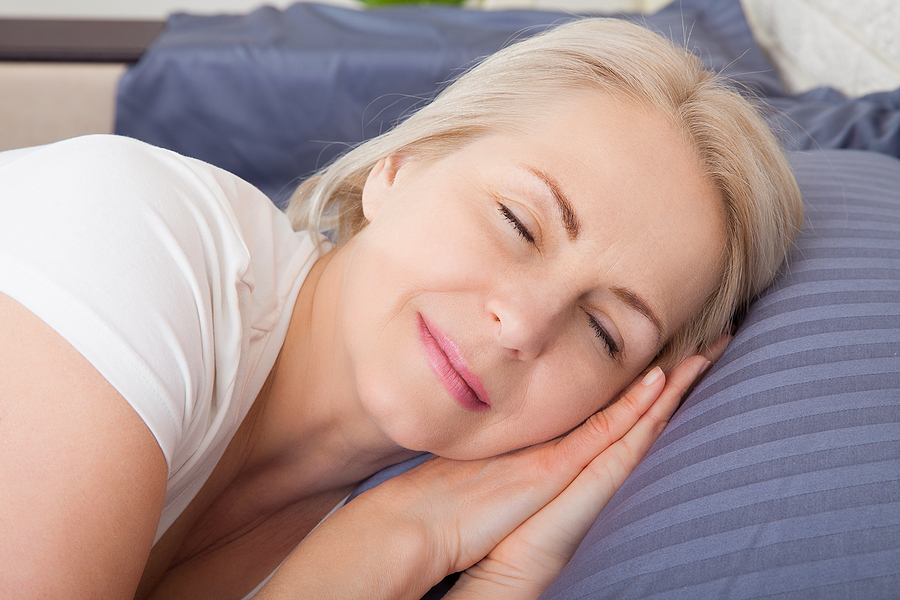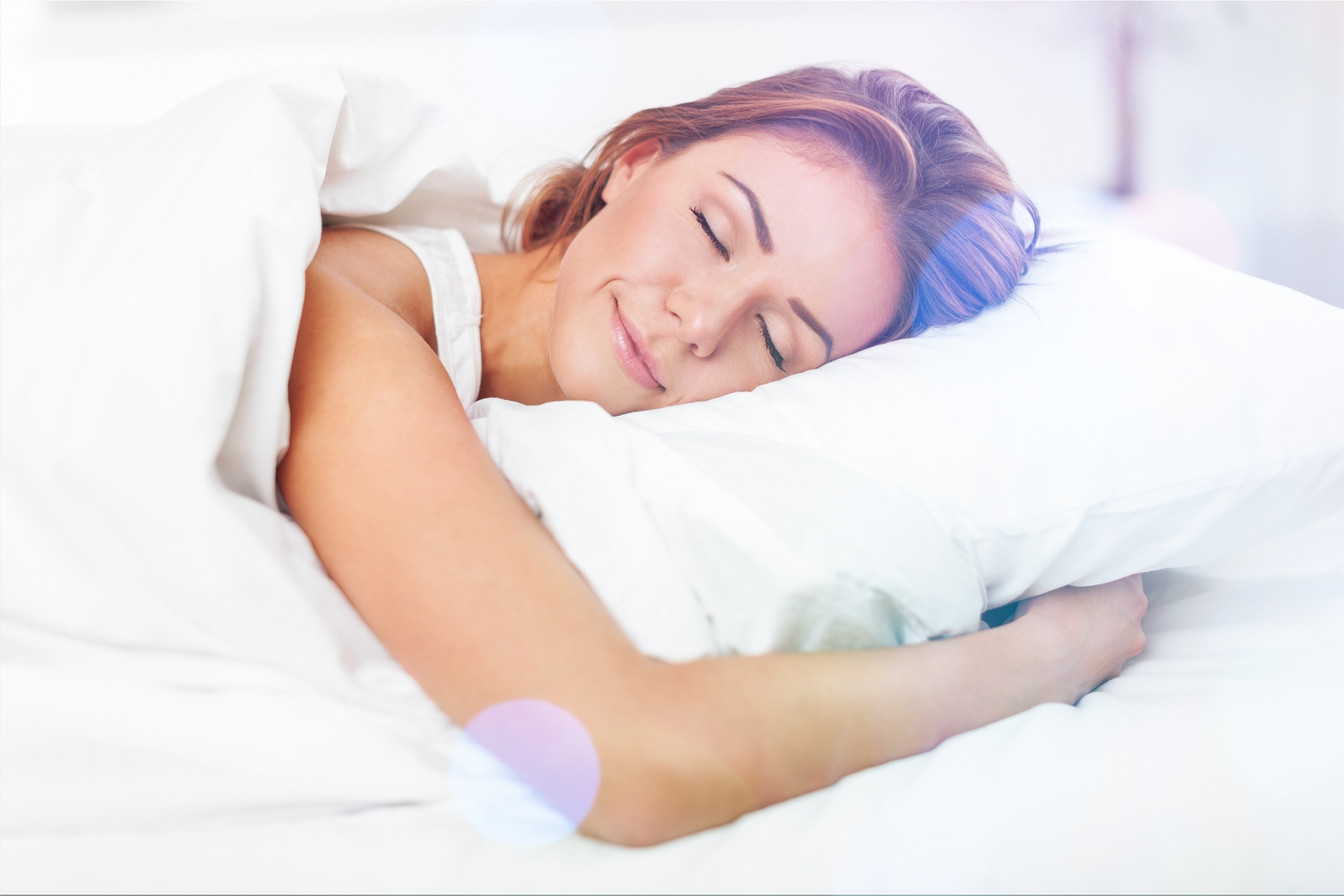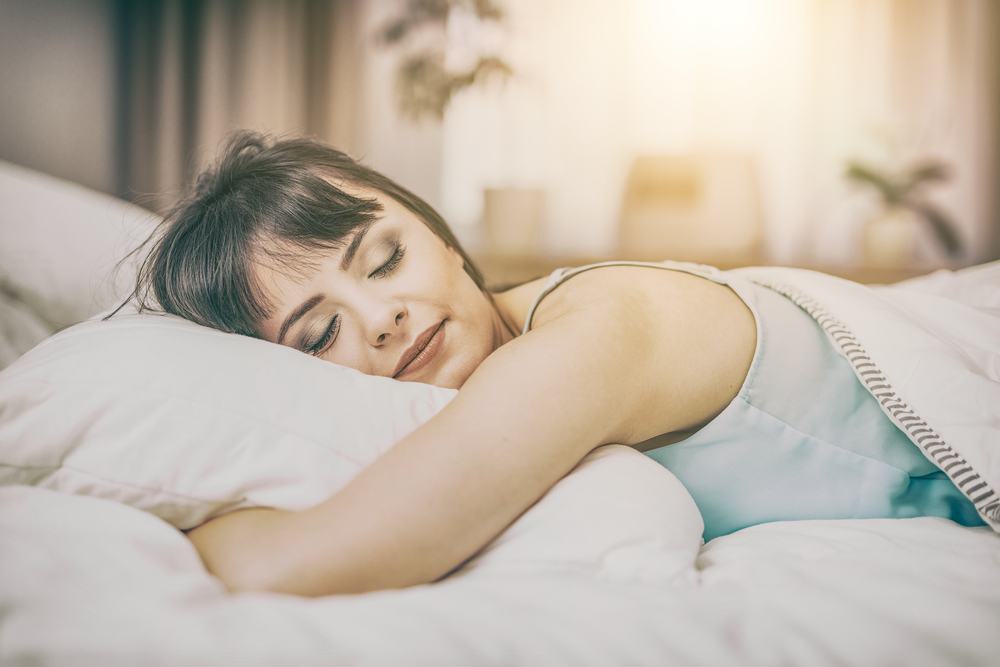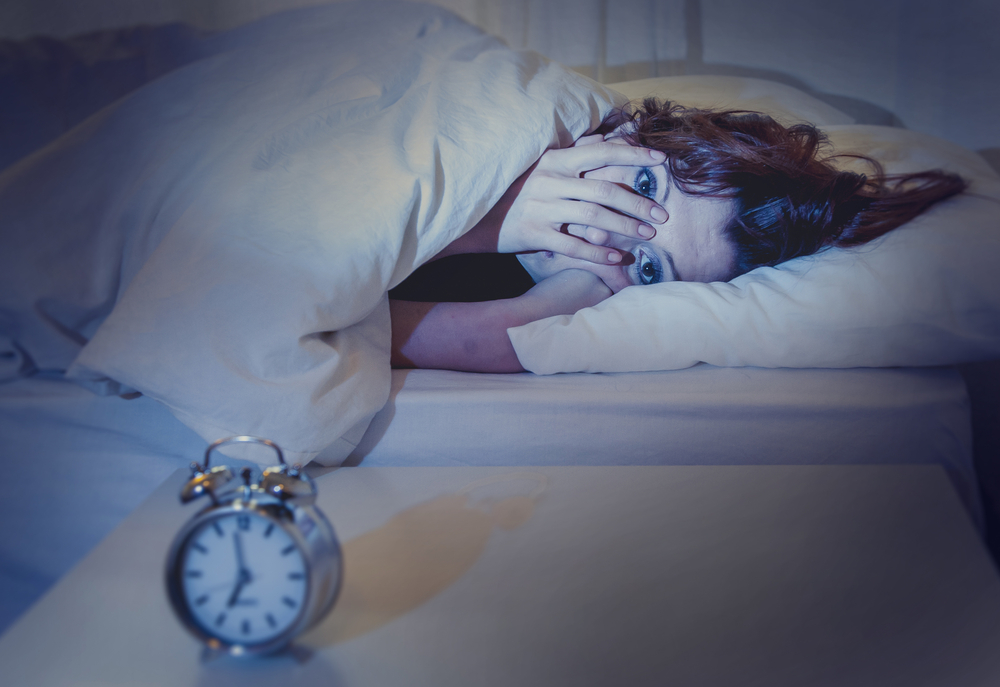My friend Betty gets into bed at night, and her thoughts begin to race. She details all of the things that went wrong that day, all the things she could have done differently, all the things that are coming her way in the morning. She lies awake long after she’s gone to bed, growing more and more stressed as time passes by and she realizes how little sleep she’ll actually be getting. Sometimes, she falls asleep quickly, but tosses and turns restlessly, never really reaching a deep sleep state. Or she wakes from a deep sleep at 3 am drenched in sweat, and can’t get back to sleep.
Does Betty’s situation sound familiar? Do you wish you could sleep better at night? If so, you certainly aren’t alone! According to Centers for Disease Control and Prevention, 35% of Americans don’t get enough quality sleep. That’s right — a third of the people in our country aren’t getting the sleep they need, and I think that number is really lower than what I see in my practice.
Not sleeping well certainly leaves people tired and drained the following day. And if the nights of poor sleep pile up, a wide range of serious health issues – both physical and emotional – can arise. Not only that, but sleep deprivation shows on your face, too!
Most people know that it’s essential to get regular sleep, but that doesn’t help when you are trying, but sleep doesn’t come. I understand completely; I’ve had more than my share of sleepless nights in the past!
The good news is that research on sleep is plentiful, and there are some evidence based suggestions that can make a real difference. Let’s take a look at why sleep is so important, and what circadian rhythms are all about. Then, I’ll fill you in on some of those research based ideas so that you, too, can sleep better and wake up bright-eyed and ready to face the day.
Why is Sleep Important?
Most people have heard that sleep is important — but do they know why? It goes far beyond feeling tired, having low energy, and decreased productivity at work. There’s a wide body of research that documents how critical sleep is to survival. Animal studies have shown that when rats are deprived of sleep they live only three to five weeks instead of two or three years. Imagine what that could mean for humans!
Both the nervous system and immune system count on sleep to function properly. A wide range of serious health problems can arise when you are chronically deprived of sleep. These include:
- Mood disorders
- Memory issues
- Heart disease and hypertension
- Diabetes
- Obesity
- Increased risk of breast cancer
- Premature aging
That’s a lot of problems, and it’s not even a comprehensive list! So, how much sleep do you need? Like with everything, your individual needs will vary. But most adults feel best if they get at least 7 (8 is even better) hours of sleep per night. Even though there are a very few people who can function on less than six hours of sleep per night, for most people, repeatedly skimping on sleep can lead to a major health crisis.
Disruption of the circadian rhythm is a big contributor to insomnia and restless sleep. Let’s take a look at what a healthy rhythm looks like, and the sleep cycles you experience each night, then I’ll give you those tips to return balance to your circadian rhythm and improve your sleep.
How Do Circadian Rhythms Work?
You probably know that a circadian rhythm is an important factor in when you sleep, but do you really know what that means? What are circadian rhythms anyway? According to a fact sheet from the National Institute of General Medical Sciences, “Circadian rhythms are physical, mental, and behavioral changes that follow a daily cycle. They respond primarily to light and darkness in an organism’s environment.”
These rhythms are produced by a biological clock. And you don’t just have one; these natural timing devices are found in most of the organs and tissues in your body. Biological clocks regulate the timing of circadian rhythms.
You also have a “master clock” called the suprachiasmatic nucleus, or SCN, that keeps all of your biological clocks synchronized. Your master clock receives information directly from your eyes.
Your circadian rhythm is determined by factors both within and outside your body. One of the biggest signals impacting circadian rhythms is daylight. When light-dark cycles are changed, biological clocks and circadian rhythms can get faster, slower, or be reset.
Because so many things rely on circadian rhythms to stay regulated – including that all important sleep-wake cycle – chronic health problems can result when these rhythms aren’t regular.
When it comes to sleep, your SCN receives messages from light that let it know when it’s time to produce the hormone melatonin, which makes you feel drowsy. In these modern times, the world around us is perpetually lit up. So it’s no wonder our circadian rhythms end up out of whack. But if you can’t get them regulated, your sleep will suffer!
Why is Getting Good Sleep So Difficult?
If you wish you could sleep better, know that you aren’t alone. Statistics show that 40 million Americans have trouble sleeping. Why are so many people having sleep issues? It’s hard to pinpoint, partly because there are so many different potential problems, and so many factors at play.
Our chaotic modern life, demanding work expectations, and the constant need to be connected certainly isn’t helping. Our electronic devices are an endless source of entertainment, with email to check, movies to stream, and email and social media to monitor. Work is often a factor in staying up late, whether due to longer shifts at the office or bringing work home. But you aren’t doing yourself – or your employer – any favors by burning the midnight oil. In fact, the estimated cost to US Employers in loss of productivity due to sleep issues is a staggering 18 billion dollars per year.
It’s far too easy to get caught up in demands that keep you on the run long after your work day is done. But it’s so important to find time to relax, unwind, and prepare your body for sleep. If you’re doing household chores – or worse, checking email or putting out work fires, until late in the evening, you are robbing yourself of essential self-care. And that is putting your sleep quality at risk! Let’s take a look at some tips to help you change these patterns and get better sleep at night.
7 Evidence Based Tips to Help You Sleep Better
Wouldn’t it be great to lie down in bed and fall asleep quickly? Waking up clear headed and with the energy you need to get through your day is so important. Right now, you may be stuck in an endless loop of sleepless nights and days survived only with copious amounts of caffeine, but it doesn’t have to be that way! With a few adjustments to your lifestyle and routine, and some awareness about the things that impact sound sleep, you can change your sleep patterns. I’m here to help.
So many people give advice about how to sleep better – you might be wondering how to sort through all the suggestions to find some that really work. That’s why I put together these seven tips that are backed by scientific research.
1. Maintain Consistent Routines
If you have to get up at 5 am during the week to prep for work, you need to go to bed by 10 to get seven hours of sleep. That can make it really tempting to stay up later on weekends, and sleep in the next day. So many social events happen on Friday and Saturday night, and it’s tough to plan these around an earlier bedtime. I love to ballroom dance, for example, and most dances don’t even begin until 8 pm!
But there’s evidence that irregular sleep habits can impact circadian rhythm. That’s why it’s best to choose a time that meets both weekday and weekend needs, and stick with it. You might have to examine your priorities really carefully to find the schedule that suits you best. Once you do, protect that bedtime like any other appointment — anything that didn’t get done can wait until the next day!
It’s not just a consistent sleep schedule that can make a difference. At least one study has shown that consistent routines in general promote good sleep. That means that having a specific time to eat, sleep, exercise, and even go outside can make a big difference when you lay down at night!
2. Move Early, and Often
Helping you get quality sleep is just one of the many amazing benefits of regular physical activity. But because exercise prompts the release of endorphins, working out too late in the day might actually make getting to sleep more difficult.You don’t have to spend hours at the gym – just twenty to thirty minutes of exercise per day will do the trick. Try working out before you head to work to jump start your day, or fit in a late afternoon workout to help you wind down after work.
3. Break Unhealthy Habits
Do you smoke when you’re nervous, give yourself a caffeine energy boost regularly, or relax with a glass of wine in the evening? If so, it might be time to re-examine your coping strategies. All of these substances can make sleep more difficult. Alcohol disrupts deep sleep and REM sleep, caffeine is a stimulant that can keep you from falling to sleep in the first place, and nicotine withdrawal might mean you wake up far earlier than you need to.
Smoking causes so many other health issues that it’s best avoided altogether. Moderation is key for both alcohol and caffeine. To avoid sleep disruption, don’t consume either too close to bedtime.
4. Set the Scene for Sleep
Your bedroom should be a sanctuary: peaceful, quiet and comfortable. Both external noise and temperature have been shown to impact sleep quality. Making sure you won’t be disrupted by traffic, household sounds, or excess heat is important. Make sure you leave distractions outside of the room to allow you to really relax when it’s time for sleep.
A regular bedtime routine that includes breathing, stretching, meditation, or a warm shower or bath can also help you wind down and be ready for sleep.
5. Get Enough Bright Light — But Not Too Late at Night!
Bright light, like natural sunlight, helps keep your circadian rhythms consistent. Evidence has shown that insomnia can be alleviated by exposure to bright light. Another study showed that exposure to blue-enriched white light in the workplace led to better sleep quality.
It can be tricky to get enough light in many regions, especially in the winter months. Try taking a walk mid-day when the sun is brightest, or using a specially designed therapy light.
But be careful about the timing of light exposure. Blue light from electronics, in particular, can confuse your body, and decrease melatonin production at night, when you should be getting sleepy. That’s why I recommend turning off all electronics at least an hour before bedtime.
6. Eat Well, and Avoid Late Night Eating
A wealth of research has demonstrated a link between diet and sleep. It often feels like a “chicken and egg” situation — does good sleep promote healthy eating, or vice versa? I’d say the answer is both! When you’re tired, you are much more likely to make poor dietary choices. But when you eat the wrong things before bed, you might well be setting yourself up for poor sleep. There are some foods, particularly those that impact tryptophan, serotonin and melatonin, that likely aid you in getting quality sleep the most.
7. Give Yourself a Natural Boost
Sometimes, no matter what you try, you need a little more help. Melatonin has been shown to be especially important to the sleep-wake cycle. But it’s not the only thing proven to promote relaxation and quality sleep.
Studies have also shown the effectiveness of the amino acids Glycine and L-Theanine, magnesium, ginkgo biloba, valerian root, and lavender, among other things. My sleep support program is a special blend that includes melatonin, L-theanine and valerian root, along with other nutrients known for calming brain activity and promoting quality sleep.
Be Sure to Rule Out Underlying Sleep Disorders
Stress and anxiety are certainly behind many sleeping problems, especially in women. But you want to be sure that there isn’t another condition behind your disrupted sleep. Sleep apnea, which causes people to stop breathing while they sleep, is just one such issue. Others include circadian rhythm sleep/wake disorders, and sleep movement disorders (such as restless leg syndrome). If you have been experiencing chronic sleep difficulties, be sure to speak to your healthcare provider to determine if one of these more serious conditions is at play.
Don’t Let Lack of Sleep Hold You Back!
Sleep issues are so common, but there are so many things you can do to help yourself sleep better. There’s simply no need to keep looking and feeling exhausted all the time! With these scientifically proven methods, you can get your circadian rhythm back in sync, and wake up well rested and ready to seize the day! Sweet dreams!
References:
https://www.nigms.nih.gov/Education/Pages/Factsheet_CircadianRhythms.aspx
https://www.healthline.com/nutrition/17-tips-to-sleep-better
https://www.sleepfoundation.org/sleep-tools-tips/healthy-sleep-tips
https://www.huffingtonpost.com/2014/03/17/better-sleep-tips-best_n_4958036.html

